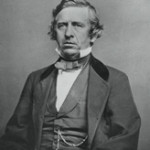History comes to us through the filter of time. Motivations and issues become digested into simple statements of right and wrong. But we should be wary of distilling pivotal times and events of history into black and white. A perfect example of this caution actually revolves around the Civil War-era issue of black and white – and the Thirteenth Constitutional Amendment freeing the slaves.
We have long been taught that the North fought against the South to free the slaves from the onset of the War of the Rebellion. A more accurate viewpoint might be that while slavery was the spark that started the fire, the issue of individual state’s rights versus the preservation of the Union was the fuel. The majority of the population of the white South were not slave owners. And while many in the North decried the institution of slavery, the vast majority decidedly viewed the African American race as their inferiors. Hartford’s own Gideon Welles, Lincoln’s Secretary of the Navy, was vehemently against granting African Americans the right to vote given their lack of education, a convenient view held by many to justify their bigotry. One strong motivation behind the passage of the Thirteenth Amendment might even have been the meting out of punishment to the Southern enemy. [1]
As the Civil War was moving towards its end, President Lincoln felt an urgency to have the 38th Congress ratify the amendment even though the incoming Congress would have a Republican majority. On April 8, 1864, the United States Senate passed the resolution by a vote of 38 for and 6 against but the bill failed when introduced in the House of Representatives the next month. When reintroduced in the House just months before the end of the war, the resolution was approved by a vote of 119 for, 56 against and 8 not voting.
All six members of Connecticut’s congressional delegation voted in favor of the Thirteenth Amendment. Hartford’s members – Senator James Dixon and Congressman Henry Champion Dixon (a veteran of the 12th Connecticut Volunteer Regiment)– were staunch Republicans and their votes were assured. But one member from Connecticut, Congressman James Edward English of New Haven, crossed the aisle along with fifteen of his fellow Democrats to vote with their conscience instead of following their party’s line. In discussing this momentous vote with a New Haven friend, Congressman English said
I suppose I am politically ruined but that day was the happiest of my life. [2]
Soldiers returning from the war with their black regiments later in 1865 may have had their constitutional freedom but their military service and valor did not automatically confer the full rights of citizenship – including the right to vote – upon them. (See blog entry Separate Not Equal). Matthew Warshauer, in his recent book Connecticut in the American Civil War, reminds us “that ending slavery did not put to rest the formidable issues attached to race, issues that reverberate to this day.” [3]
To commemorate anniversary of the passing of the Thirteenth Amendment – and to correct the voting record of Connecticut’s delegation as depicted in Stephen Spielberg’s movie Lincoln – Connecticut Congressman Joe Courtney has issued Honoring Connecticut’s Role in Abolishing Slavery, 150 Years Later.
[1] Warshauer, Matthew Connecticut in the Civil War (Middletown, Conn: Wesleyan University Press, 2011), 167.[2] English, Anna Morris In Memoriam, James Edward English (Privately printed, 1891), 23.
[3] Warshauer, 167.

